The Hidden Reason You Shouldn’t Let Your Dog Sleep on Your Bed
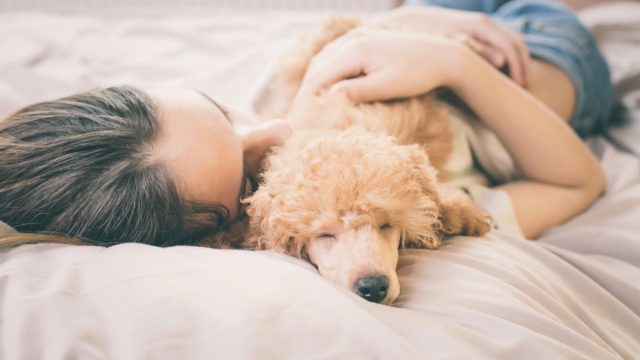
Having your dog by your side is one of the best feelings. Sociable pups love to be as close to their owners as possible, cozying up while you’re watching TV or reading a book. You might let your dog sit with you on the couch, as long as they know not to gnaw away at the upholstery, or even curl up beside you in bed. But according to veterinarians, letting your dog cuddle up close to your pillows might not be the safest choice. Read on to learn the hidden reason you should never let your dog on the bed.
READ THIS NEXT: If Your Dog Is Playing With This, Take It Away Immediately.
Your dog may not be as “clean” as they seem.
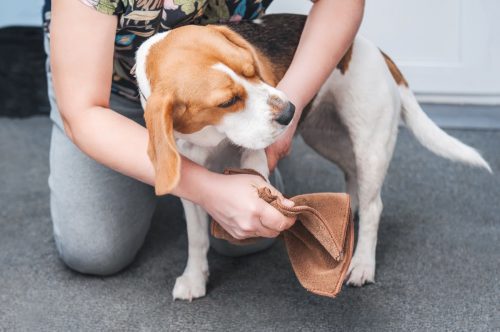
Unlike humans, dogs (generally) don’t have the luxury of clothing or shoes. Unless you’ve invested in a raincoat, sweater, or even boots for your four-legged friend, they’re going to be in their birthday suit. So while you come back inside and take off your sneakers after a game of fetch, your dog can’t do the same—maybe you’ve even been forced to clean up some muddy paw prints after a rainy walk.
If your dog is visibly dirty, you’re probably not going to let them near furniture, let alone on or your bed, until they’ve been thoroughly bathed. But even dogs who look clean can also carry some unseen dangers on their fur, which could put your health at risk while you sleep.
Your pup could get you sick.
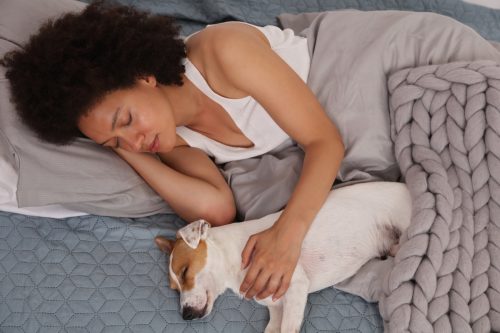
According to veterinarians and dog trainers, your dog could be carrying something sinister on their fur—namely, harmful bacteria and parasites.
“One important reason why you should avoid having a dog sleep in the bed is the risk of illness for humans,” Dwight Alleyne, DVM, veterinarian advisor at betterpet, tells Best Life. “Some dogs may carry parasites, fleas, and sometimes cause allergies in those who are sensitive.”
In general, dogs are at a higher risk of having these germs than humans, according to Jeff Netzley, dog trainer and founder of Dog Training Near You.
“Normally, these are not spread to humans unless the dogs maintain close contact with them,” he says. “However, if you are letting your dog sleep in bed with you, there is a much higher chance that these germs and parasites will spread to you. This can be especially dangerous for young children or elderly people who may not have a strong immune system.”
This applies to your dog even if they’ve received all of their required vaccinations, Leonardo Gomez, founder of Try Runball, says.
READ THIS NEXT: 6 Secrets Veterinarians Aren’t Telling You About Your Dog.
Potential illness isn’t the only reason doggie co-sleeping should be avoided.

In addition to getting you sick, you might not feel fully rested after sleeping beside your dog. “Dogs are not known for being quiet sleepers,” Netzley says. “They may move around a lot during the night, which can disturb your sleep.”
He points to your dog’s sleep patterns, which differ from humans. “Consider how much your dog sleeps in the middle of the day,” he explains. “They may be more active at night, or they may be awake and ready to go at a very early hour in the morning. All of this activity can make it hard for you to get a good night’s sleep.”
Dogs also tend to run hot, as they can’t regulate their body temperatures as well as humans do, which can make you and your dog equally uncomfortable. And if that discomfort leads them to jump off the bed in the middle of the night, they could easily be injured.
Experts have different stances on whether it affects behavior.
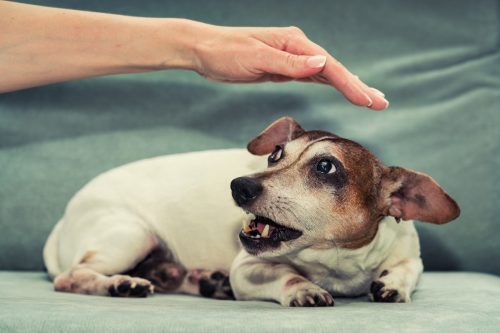
After becoming your sleeping buddy, veterinarians say you dog may start to display some different behaviors. “Some dogs are prone to dominance and aggression issues and may start to guard things around the property,” Linda Simon, MVB, MRCVS, consulting veterinarian for FiveBarks, explains. “It is not unheard of for dogs who resource guard to try and guard their owner’s bed, putting the owner at risk of a snarl or snap when they are simply trying to get into bed, or to move the dog off the pillow.”
Netzley notes the potential for a more aggressive pup, as they can “start to believe that they are the leader of the pack.” This is especially true if you tried to keep your dog off of the bed at first and eventually gave in.
However, Meg Marrs, dog trainer and founder of K9 of Mine, disagrees, claiming that the dominance factor is a myth. “You don’t need to worry—your dog likes sleeping in your bed because it’s comfy and smells like you,” she says. “They’re not looking to become a bedroom dictator!”
For more pet advice delivered straight to your inbox,sign up for our daily newsletter.
There are other options to keep your pup close at night.
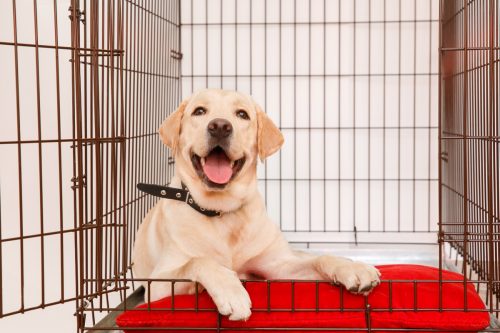
Due to the potential hazards associated with sleeping beside your dog, you might want to consider other options. If you have a new puppy, they might actually feel more comfortable and cozy in a crate. “Dogs love their crates, and if you set one up in the same room as your bed, it will be an easy transition to get used to sleeping in the same space as you,” Alex Schechter, DVM, of Burrwood Veterinary Hospital, says. When your dog gets older, you can consider moving the crate to another room or opting for a comfy dog bed.
If you’re trying to transition your dog from your bed to their own, this can be tricky, but not impossible. “Try to make it as positive as possible for your dog,” Netzley suggests, adding that the most important component of the transition is praise.
“Dogs are very responsive to positive reinforcement, so if you make it clear that you are happy when they are in their bed, they will be more likely to do it,” he says.